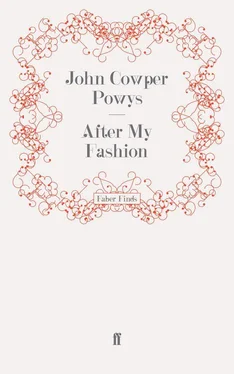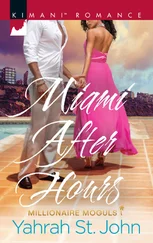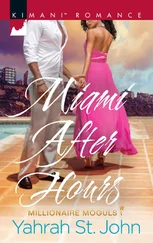Three days after their departure from the Pennsylvania Station Richard and Elise were walking together on the sands by the edge of the sea. He had sent a telegram to his office begging them to give him a brief holiday and promising to send them all necessary copy by mail. He had written briefly to Nelly — a letter full of half lies in which he announced that he would return with Ivan and Catharine in a few days.
His time with Elise had been a turbulent one, full of violent quarrels and passionate reconciliations. As they drifted together now, side by side along the water’s edge, they were engaged in bitter recrimination.
Above them, supported on wooden trestles, stretched the famous board-walk, frequented even then, at the end of the autumn, by a gay and noisy crowd.
On the further side of the board-walk a long line of small wooden shops offered the visitors to that newfangled promenade every sort of fantastic novelty.
Richard and Elise, absorbed in their quarrel, moved along the brink of the ocean until these shops began to thin out and disappear. But even beyond where the shops ended, that immense boardwalk continued to extend its length. It was borne in upon Richard’s mind that by use of its ironwork and its woodwork the American public loved to separate itself from nature and to dominate nature with a certain brutal contempt.
Not a living soul except themselves was to be seen walking upon the sand or close to the water. Directly the actual bathing season was over, during which, in their super-moral costumes, they had lain about in the hot sunshine, all the visitors to Atlantic City congregated upon those high-erected boardings and peered triumphantly at the elements in the intervals between moving-picture shows and flirtation.
Where Richard and Elise were now walking, the noises of traffic and entertainment had ceased; the high bare boards had a look quite peculiar to themselves and different from any other inanimate objects in the world.
They were curiously melancholy, these projections of woodwork, but not melancholy in the manner in which most new human erections are depressing and sad when contrasted with so old a thing as the sea: they were full of peculiar loneliness and desolation of their own — and one not devoid of an appeal to the imagination — but it was a desolation quite different from that produced by deserts or moors or marshes. It was a negative desolation, wherein the mere absence of humanity in a place obviously built for humanity evoked something peculiarly forlorn.
Still exchanging words of cruel and wounding bitterness, such as only those who are physically attracted without being temperamentally congenial are capable of flinging at one another, the two lovers were soon out of reach of the town altogether; the famous board-walk had dwindled to a narrow plank path.
Here they found themselves in a world of more attractive melancholy. Beyond the sea bank there stretched a vast expanse of reeds and rushes, and by the edge of the sand dunes where they were now wandering grew all manner of glaucous sea growths mingled with wild purple asters.
Every now and then they might have seen a long line of wild geese, travelling at an enormous height in the air, and sending down that peculiar sound, by the creaking of their wings, which can be only expressed by the syllables hank-hank or honk-honk .
But they did not look up at the sky at all just then; and the lines of flying wild fowl meant nothing to them; and the vast grey plateau of the ocean meant nothing to them; and the shells upon the white sand meant nothing to them.
They were two human beings, engaged in the immemorial occupation of sticking poisoned arrows into one another’s hearts. Absorbed in this delicate pastime, they were oblivious to all else in the round world.
The real cause of their disagreement was the shock to their nerves of this reckless adventure and the simple fact that being neither of them young they lacked the resilience to recover themselves.
Remorse in Richard made a bitter and poisonous background for new romance. Not for one single moment could he really obliterate his wife’s figure — silent and upbraiding, ironical and mocking, beautiful with the beauty of youth, and bearing his child at her heart.
The very air of gallantry which the pleasure city exhaled, like the sea breath of Aphrodite, was bitter and vulgar in his nostrils. All this transitory woodwork, all these painted wooden shops and flaunted showhouses seemed thin, sad and insubstantial to his spirit. The immense waste of November waters, shot with pale white sunshine or desolately grey, seemed to reduce all these theatrical attempts at pleasure and passion to a sort of fantastic Maya or unreal illusion, a gaudy ripple upon a vast emptiness.
Too sick at heart, too cruelly torn between the two women, to enjoy the escape which now offered itself as they left the houses behind and began to breathe the unsullied breath of the Jersey coast, Richard had a strange sense, as he wrangled with his companion in one of those interminable lovers’ quarrels which seem like elemental forces, that he and she were will-less automata, doomed to hurt each other for the amusement of unseen spectators.
Struggling to break loose from the exhausting logic of anger which poisoned the air about them, he stopped at last and began tracing patterns with his stick in the white sand.
He drew an ornamental E and a deeply indented A on that smooth surface. But no sooner had he done so than an angry contempt for his own sentiment made him erase both of them with a violent gesture. The dancer’s face was pale and sardonic as she watched him; her red lips curved in a hard significant smile.
‘You don’t know what the word love means,’ she said suddenly.
‘I wasn’t writing love ,’ he retorted childishly.’ Can’t you read English? I was making your initials.’
‘In sand,’ she said.
‘Well! they’re gone now, anyhow.’
‘It’s the fact of your being English, I suppose,’ she remarked, looking at him with a misery of indignation. ‘I hate all you English. Your feelings are clotted up with clods of earth — gross, thick, heavy clods of earth! Not one of you can be clear and free and honest. You worship what is , just because it is . It’s worse than materialism, it is absolute deadness! And what’s more you’re not content until everyone’s as dead as you are. Dead words, dead sentiment, dead hearts! You’ve no real courage in you … without courage everything becomes initials written on sand!’
Richard’s face assumed the bewildered expression of a child that is beaten for an unknown fault. His superficial cynicism was swallowed up in real trouble. He looked at her like a dumb flogged animal.
His bewilderment increased her anger.
‘These three days with you have killed my love,’ she said. ‘You’ve done the unpardonable thing … and you’ve made it worse by your stupidity. It would have been far better if you’d known what you were doing. It has been like being tied to a corpse!’
‘I thought we’d been so happy,’ he murmured.
‘That’s just it,’ she cried, ‘it’s always happiness, happiness, happiness with you! Have you no idea of great, beautiful, terrible things that have to be paid for by the loss of all that? Happiness? My God! It means comfort to you — a nice, easy, complacent English comfort.’
‘It’s you who are not honest,’ he muttered. ‘Why can’t you confess the truth? You’re angry with me for quite a different reason from the one you’re talking about.’
She flashed at him a look of splendid fury, a look that made her so beautiful that he was completely disarmed.
Читать дальше











